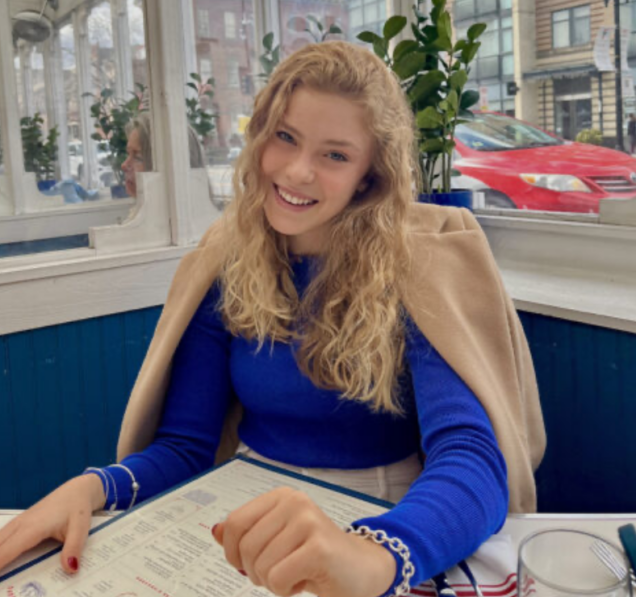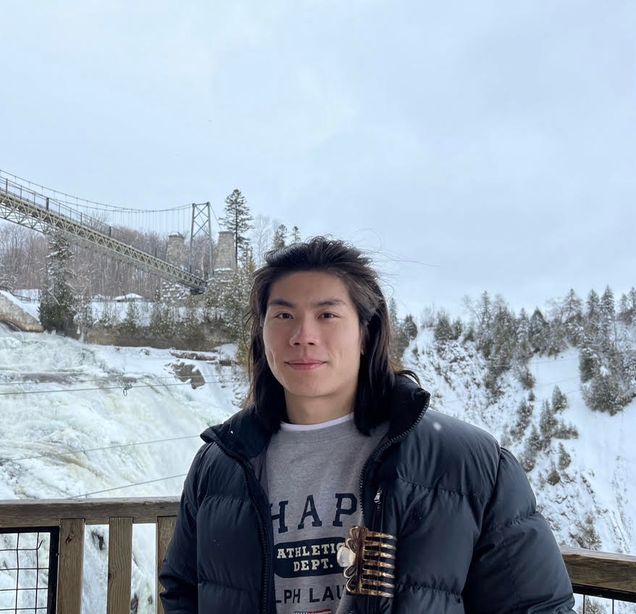5 CDS Students Share Their Summer Internship Experiences
College students eager to join the workforce may already know the stress of cramming in experience. Between school and personal life, the leftover time to build your resume is slim.
Luckily, summer internships present the perfect professional opportunity to show hiring managers you’re passionate about your field of choice while still in college. And with data science listed as one of Forbes’ fastest growing careers of 2023, a slew of new internship opportunities have been opening doors for Computing & Data Science (CDS) students.
One major benefit of internships? Discovering what aspects of data science interest you most.
“Across all fields, data plays a critical part in enabling new discoveries and the creation of new technologies, so having the opportunity to work with the data and build tools and services to support them is exciting," said Alicja Mahr, data science major (CDS'25) and technical staff intern at Cohere.
These five CDS students are exploring their interests through a summer internship and gaining valuable experience to use throughout their careers.

Vijay Fisch, Data Science (CDS'26)
Research Assistant for Stephanie Ternullo, Assistant Professor of Government at Harvard University
Q: What are your daily tasks?
Q: How does your data science coursework connect with your internship?
Q: What aspect of your internship do you like most?
Q: What industry are you interested in post-graduation and how do you envision using data in your professional career?
Q: Do you have any advice for data science students looking for internships?

Mariana Medeiros, Data Science, (CDS'25)
Technology Risk Intern at Ernst & Young
Q: What are your daily tasks?
Data analytics, power bi, generating LLMs (coding), using AI, cybersecurity, and license management
Q: How does your data science coursework connect with your internship?
My internship directly relates to DS310 and the coding classes I took.
Q: What aspect of your internship do you like most?
The people, the collaborative environment, and brainstorming to problem solve are the aspects I like the most.
Q: What industry are you interested in post-graduation and how do you envision using data in your professional career?
I'm interested in cyber security and using data analytics to understand what server or licenses provide the greatest safety to clients.
Q: Do you have any advice for data science students looking for internships?
Data science is a huge field. Choosing a couple of interest areas to specialize yourself will set you apart. Whether that is applying data science to the financial, real estate, or marketing sector, choose something you are passionate about.

David Gardner, Data Science (CDS'26)
Data and Analytics at Julius Education
Q: What are your daily tasks?
I have been working with large language models like ChatGPT, Bard, and Google PaLM to generate job title skill profiles and descriptions. I use the ChatGPT API in Python. I also cleaned and normalized a dataset from U.S. Energy & Employment Jobs Report (USEER).
Q: How does your data science coursework connect with your internship?
I frequently refer back to the PANDAS lecture from DS110 with Professor Gold because I work with dataframes.
Q: What aspect of your internship do you like most?
I like the human interaction the most. I've set up coffee chats with a few of my coworkers and it has been very interesting learning about their stories.
Q: What industry are you interested in post-graduation and how do you envision using data in your professional career?
I am interested in working in sustainability, specifically on the technology development side. Currently I'm interested in the built environment and alternative materials spaces. I'm not sure what exact jobs that I'll have in the future, but I'll likely use data by testing how a product is working or automating a part for a product.
Q: Do you have any advice for data science students looking for internships?
In addition to applying to positions of interest, apply to companies where you have connections. For all three of the companies that interviewed me, I had someone who had a connection to the company reference me. As a freshman, it can be very daunting because you may not have a big network. However, you likely have many connections through friends and family. Mention to these people that you are searching for an internship and you may find that they know someone who can help you. I had connections to the companies I had interviews for because of my professional environmental fraternity Epsilon Eta. As the Alumni Chair, I organized an alumni talk with someone working at a company (Greentown Labs) that interested me. I talked with her and she was able to refer me to the hiring manager for a position at GTL.

Alicja Mahr, Data Science (CDS'25)
Technical Staff Intern, Software Engineering at Cohere
Q: What are your daily tasks?
Backend service and development, communicating with teams to develop consistent endpoint standards, and database work (designing schemas, ETL/Reverse ETL).
Q: How does your data science coursework connect with your internship?
The data structures and algorithms part of DS210 has been really helpful in my day-to-day work, allowing me to design services that are easier to maintain and more efficient. I've also found the ML portion of the course to be quite beneficial, giving me a good understanding of what other teams, like modeling, are working on. When it comes to working with databases and collaborating with other engineers, DS310's focus on infrastructure and data pipelines has been incredibly useful.
Q: What aspect of your internship do you like most?
I love how easy it is to talk with others across teams both for work related tasks and casual coffee chats. My team, Growth Engineering, is extremely supportive and helpful when it comes to unfamiliar tasks and projects and places an emphasis on enjoying your work. The open communication style and commitment to make sure everyone understands what each team is working on helps to make progress feel like "we did it" rather than "the company did it."
Q: What industry are you interested in post-graduation and how do you envision using data in your professional career?
As of right now, I'm interested in working in the natural language processing space. However, I also find the intersection between human-computer interaction and machine learning as well as bioinformatics interesting, so it's more so a matter of what road life takes me down.
Across all of these fields, data plays a critical part in enabling new discoveries and the creation of new technologies, so having the opportunity to work with the data and build tools and services to support them is exciting.
Q: Do you have any advice for data science students looking for internships?
Be unconventional. Data science is a cross-disciplinary field, and the more unique your background, the more likely you are to standout to teams who are working on your interests. In the same vein, build projects, try to reproduce papers that you find interesting, and explore.

Andy Yang (CDS'24)
Intern at BU Spark! and AI Camp
Q:What are your daily tasks?
This summer I have taken on two distinct internships, one at BU Spark! focusing on data engineering, and another at a small company called AI Camp, where I taught students data science and built a cool project.
At AI Camp, I spend most of my day leading a batch of students in creating an end-to-end data science project. This involves imparting knowledge of Python, pandas, scikit-learn, and even some front-end technologies. Additionally, I am part of a team working on a QA bot for Retrieval Augmented Generation, which basically means: I can upload some documents and ask questions to a chatbot that answers using information from the documents. In this project, I get exposed to a lot of NLP topics as well as work with a novel Python package called Langchain, which is a framework for developing applications powered by language models.
Over at BU Spark! I handle a variety of tasks under the guidance of my fantastic supervisor, Michelle Voong. She keeps me engaged with intriguing challenges, whether it's exploring the various tools within the Apache software suite, writing a guide on geographical data analysis using Python, or finding ways to implement version control for datasets used in project-based classes during the semester.
Q:What aspect of your internship do you like most?
The most exciting parts of my internships are working on the QA Bot and the Data@Spark! project.
The experience of playing around with new technologies like Langchain and different LLMs is very exciting. I literally learn something new every time I sit down to get some work done. It's a pretty cool feeling to learn on the fly and work on a project that uses all this new tech.
Similarly, my work on the Data@Spark! project is also something I find really captivating. The idea of developing and designing a resource/tool that could be used by a bunch of people is inspiring and adds an extra layer of motivation and satisfaction to my work. And of course, being able to add these two significant projects to my resume is something I appreciate not just for its professional value but also as a personal testament to what I have learned and achieved.
Q: How does your data science coursework connect with your internship?
I think the connection between my data science coursework and my internships is best seen at AI Camp. Teaching students about Exploratory Data Analysis (EDA) and Machine Learning (ML) often reminds me of classes like XC410 and DS340/DS121.
In XC410, taught by wonderful Professors Ethan and Pat, I delved into the techniques and nuances of EDA, learning how to handle, visualize, and interpret large datasets while working to solve a problem for a client. Now, when I teach these same principles to the students at AI Camp, I find myself drawing from the insights and methodologies I absorbed in this course. I feel like it also really solidifies my knowledge of pandas and data visualization tools.
Similarly, teaching ML at AI Camp can find its roots in DS340 and DS121. Thanks to Professors Gold and Varia, these courses equipped me with a deep understanding of different models, best practices, and other essential components of machine learning. I now find myself employing this knowledge to teach my own students, breaking down complex concepts into digestible and engaging lessons.
Q: What industry are you interested in post-graduation and how do you envision using data in your professional career?
Q: Do you have any advice for data science students looking for internships?
 About the Author: Lydia Evans (COM'25) is a CDS communications writer. Lydia is also a general assignment co-op for Boston.com and previously served as editor-in-chief of The Daily Free Press.
About the Author: Lydia Evans (COM'25) is a CDS communications writer. Lydia is also a general assignment co-op for Boston.com and previously served as editor-in-chief of The Daily Free Press.